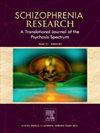加速心理干预的发展,以恢复精神分裂症谱系障碍患者的治疗决策能力:一项总括性试验
IF 3.5
2区 医学
Q1 PSYCHIATRY
引用次数: 0
摘要
许多患有精神分裂症谱系障碍(“精神病”)的个体缺乏对精神治疗做出决定的能力(“无能力”),然而,我们缺乏来自干预措施的临床试验的有力证据来改善它。为了加速它们的发展,我们测试了“保护伞”试验是否可行。这包括同时进行多个随机对照“干预-因果”试验(ic - rct)。每一项都测试了针对个体心理机制的无能的影响。方法进行3项评价盲、多站点、ic - rct试验。每组都比较了6次针对自我耻辱(SS)、低自尊(SE)或草率结论(JTC)偏见的心理治疗,以及6次对无能原因(控制)的协作评估。有精神病、无行为能力且≥1种靶机制的成人均可参加。主要结果是招募的可行性和麦克阿瑟能力评估工具-治疗(MacCAT-T)的数据保留。结果我们招募了57名受试者,进行了60次随机分组(3名患者参加了2项试验);82%提供治疗后资料。MacCAT-T“理解”的标准化平均差异(Hedges' g)为g = 0.35 (SS;95% CI - 0.51, 1.22), g = 0.41 (JTC;−0.55,1.38),g = 0.74 (SE;−0.73,2.21),正值有利于治疗。对于“推理”,它们为- 0.20 (SS;−1.05,0.66),0.79 (jtc;- 0.20, 1.79)和0.79 (SE - 0.69, 2.27)。对于“欣赏”,它们为- 0.39 (SS;−1.25,0.48),1.76 (jtc;0.62, 2.90)和0.57 (SE;−0.87,2.02)。4名对照参与者在随机化和治疗后发生了9次严重不良事件;两名干预参与者有2个。讨论心理干预提高精神病治疗能力的总括性试验是可行的。有必要进行确定的审判。pre-registrationNCT04309435审判。本文章由计算机程序翻译,如有差异,请以英文原文为准。
Accelerating the development of a psychological intervention to restore treatment decision-making capacity in patients with schizophrenia-spectrum disorder: An umbrella trial
Introduction
Many individuals with schizophrenia-spectrum disorder (‘psychosis’) lack capacity to make decisions about psychiatric treatment (‘incapacity’), however we lack robust evidence from clinical trials on interventions to improve it. To accelerate their development, we tested whether an ‘umbrella’ trial was feasible. This involved running multiple randomised controlled ‘interventionist-causal’ trials (IC-RCTs) concurrently. Each tested the effect on incapacity of targeting an individual psychological mechanism.
Methods
We did 3 assessor-blind, multi-site, pilot IC-RCTs. Each compared 6 sessions of psychological therapy for either self-stigma (SS), low self-esteem (SE) or the jumping-to-conclusions (JTC) bias, to 6 sessions of collaborative assessment of the causes of incapacity (control). Adults with psychosis, incapacity and ≥1 target mechanism could participate. Primary outcomes were recruitment feasibility, and data retention on the MacArthur Competence Assessment Tool-Treatment (MacCAT-T).
Results
We recruited 57 participants and performed 60 randomisations (3 patients participated in 2 trials); 82 % provided post-treatment data. Standardised mean differences (Hedges' g) for MacCAT-T ‘understanding’ were g = 0.35 (SS; 95 % CI −0.51, 1.22), g = 0.41 (JTC; −0.55, 1.38) and g = 0.74 (SE; −0.73, 2.21), with positive values favouring treatment. For ‘reasoning’, they were −0.20 (SS; −1.05, 0.66), 0.79 (JTC; −0.20, 1.79) and 0.79 (SE −0.69, 2.27). For ‘appreciation’ they were −0.39 (SS; −1.25, 0.48), 1.76 (JTC; 0.62, 2.90) and 0.57 (SE; −0.87, 2.02). Four control participants had 9 serious adverse events between randomisation and post-treatment; two intervention participants had 2.
Discussion
An umbrella trial of psychological interventions to improve capacity in psychosis is feasible. A definitive trial is warranted.
Trial pre-registration
NCT04309435.
求助全文
通过发布文献求助,成功后即可免费获取论文全文。
去求助
来源期刊

Schizophrenia Research
医学-精神病学
CiteScore
7.50
自引率
8.90%
发文量
429
审稿时长
10.2 weeks
期刊介绍:
As official journal of the Schizophrenia International Research Society (SIRS) Schizophrenia Research is THE journal of choice for international researchers and clinicians to share their work with the global schizophrenia research community. More than 6000 institutes have online or print (or both) access to this journal - the largest specialist journal in the field, with the largest readership!
Schizophrenia Research''s time to first decision is as fast as 6 weeks and its publishing speed is as fast as 4 weeks until online publication (corrected proof/Article in Press) after acceptance and 14 weeks from acceptance until publication in a printed issue.
The journal publishes novel papers that really contribute to understanding the biology and treatment of schizophrenic disorders; Schizophrenia Research brings together biological, clinical and psychological research in order to stimulate the synthesis of findings from all disciplines involved in improving patient outcomes in schizophrenia.
 求助内容:
求助内容: 应助结果提醒方式:
应助结果提醒方式:


